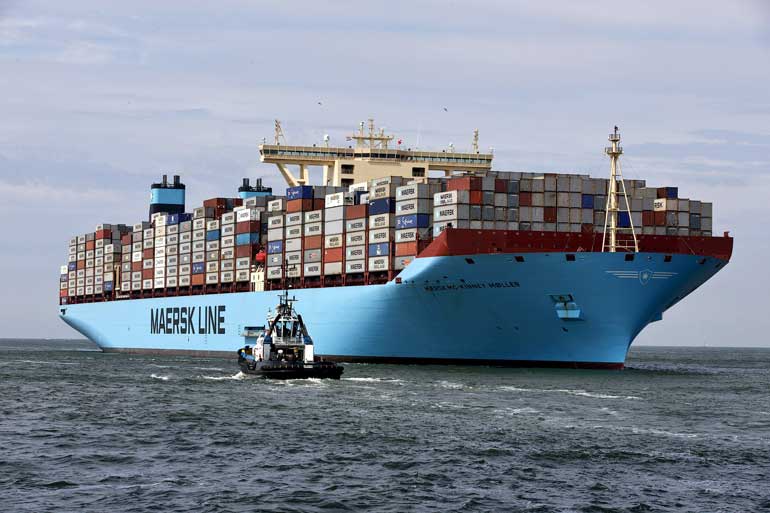Sunday Mar 01, 2026
Sunday Mar 01, 2026
Monday, 26 October 2015 00:00 - - {{hitsCtrl.values.hits}}
 The MV Maersk Mc-Kinney Moller container ship arrives at the harbour of Rotterdam, Netherlands in this 16 August 2013 file photo. Shipping mergers are leaving an increasing number of countries serviced by too few suppliers to ensure a competitive market, the UN trade and economic think tank UNCTAD said on 14 October – REUTERS
The MV Maersk Mc-Kinney Moller container ship arrives at the harbour of Rotterdam, Netherlands in this 16 August 2013 file photo. Shipping mergers are leaving an increasing number of countries serviced by too few suppliers to ensure a competitive market, the UN trade and economic think tank UNCTAD said on 14 October – REUTERS
GENEVA (Reuters): Shipping mergers are leaving an increasing number of countries serviced by too few suppliers to ensure a competitive market, the UN trade and economic think tank UNCTAD said.
Globally, there is now an average of 15.7 companies offering regular container shipping services to each country, a number that has declined steadily from 22.1 in 2004, UNCTAD said in its annual review of maritime transport.
“I don’t see any reason why this trend would not continue,” said Jan Hoffmann, head of trade facilitation at UNCTAD and coordinator of the report.
The three biggest firms – Maersk Line A/S, Mediterranean Shipping Company, and CMA CGM S.A. – have 35% of the world market, the report said. At the start of this year, the top 20 firms controlled 83% of container shipping capacity globally, and all their new orders were for bigger vessels.
“The average vessel size per country will continue to grow and so we expect there will be fewer companies in individual markets, and this is an increasing challenge for the smallest players,” Hoffmann said.
When a country has fewer than four suppliers, it risks getting squeezed because there is less pressure on shippers to compete by cutting costs, he said. There were now 32 such countries, up from 22 in 2004. Most are small island states such as Kiribati, Micronesia and Samoa. But the list also includes Iceland, Qatar, Iraq, Latvia, Eritrea, Montenegro and Cambodia.
“It’s getting more challenging for the smallest players. For the big ones – China, Europe – whether you still have 20 countries competing or 15, it doesn’t matter, you still have a choice. But when it goes down from three to two, or from two to one, then you have a critical situation.”
There was no ‘government of the seas’ with powers to protect small states against such monopolies, and it was a tricky problem to solve, he said. But small island states – many of which are seen to be at risk from global warming and rising sea levels – could push for tighter environmental standards, which would force many older ships to be scrapped and help to curb the cost pressure that was contributing to the shrinking number of shipping firms.
“It would be good for the shipping industry and for the environment if we had more stringent environmental regulations that would encourage ship scrapping,” he said.
Asian shipping lines including Japan’s Kawasaki Kisen Kaisha and China Shipping Container Lines have voluntarily lowered shipping surcharges, the China’s top economic planner said last week.
The statement by the National Development and Reform Commission (NDRC) comes after China’s cabinet last month said it was probing shipping firms over allegations that they have been levying arbitrary and excessive charges. The NDRC said Korea’s Hanjin Shipping and Hyundai Merchant Marine as well as Taiwan’s Evergreen Marine, Wan Hai Lines and Yang Ming Marine Transport Corp were among firms the firms reducing their surcharges. Japan’s Nippon Yusen KK had adjusted its fees on 15 September, it added.
The NDRC said the companies would undertake measures such as cancelling fees for some services and lowering documentation and telex release fees.